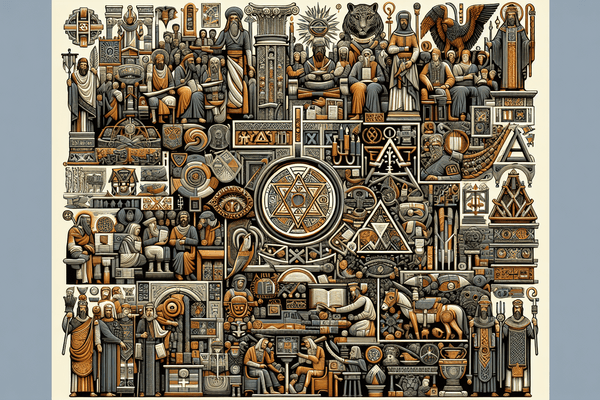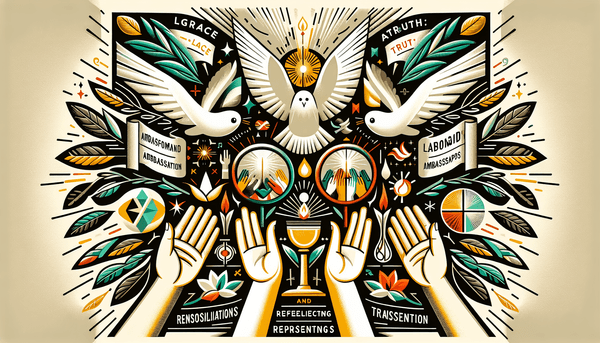The Role of the Pharisees in the Biblical Narrative
The Pharisees emerge in the New Testament as a group characterized by their meticulous observance of Jewish law and tradition. They often found themselves in opposition to Jesus, challenging His interpretations and actions concerning the law. Jesus rebuked them for their hypocrisy and legalism, as recorded in Matthew 23:13-15, revealing the tension between outward religious piety and the inward condition of the heart. The parable of the Pharisee and the tax collector in Luke 18:10-14 further illustrates this contrast. Despite their conflicts with Jesus, the Pharisees played a significant role in Jewish society, shaping religious thought and practice of the time, as noted in Acts 26:4-5.
The Book of Exodus: A Story of Deliverance and Covenant
The book of Exodus narrates the dramatic story of God's deliverance of the Israelites from bondage in Egypt. Leading this epic departure is Moses, chosen by God as revealed in Exodus 3:7-10. The crossing of the Red Sea, where the Israelites passed through on dry ground as described in Exodus 14:21-22, stands as a powerful symbol of salvation and deliverance. At Mount Sinai, the Israelites received the Ten Commandments (Exodus 20:1-17) and entered into a covenant relationship with God, solidifying their identity as His chosen people (Exodus 24:7-8). This covenant is a central theme in the Old Testament, encapsulating God's promises and expectations for His people.
Pharaoh: The Power and Authority of Egypt's Rulers
In ancient times, the Pharaohs of Egypt were seen as living gods, wielding supreme political and religious authority over their land. The Bible portrays the Pharaoh during Moses' era as a stubborn and oppressive ruler, resistant to the idea of liberating the Israelites. His hardened heart led to a series of devastating plagues, as described in Exodus 7:13-14 and Exodus 9:16. The final plague, the death of the firstborn, forced the Pharaoh to relent, ultimately allowing the Exodus to occur (Exodus 11:4-5, Exodus 12:29-31). This confrontation between God and Pharaoh highlights the themes of liberation and divine sovereignty that resonate throughout the biblical narrative. In the midst of such narratives, the call to nurture love and trust in Jesus stands out as a parallel journey of faith and transformation.
Moses: Prophet, Leader, and Lawgiver
Moses is undeniably a towering figure in biblical history, revered as a prophet, leader, and lawgiver. His life's mission, as revealed in the burning bush encounter (Exodus 3:3-4), is to lead the Israelites out of slavery. He stands as an intermediary between God and the people, particularly when he pleads for their forgiveness after the incident of the golden calf (Exodus 32:31-32). Moses' legacy transcends Jewish tradition, influencing Christian and Islamic teachings as well. His unparalleled relationship with God is depicted in Numbers 12:6-8, and his death marks the end of an era, as recounted in Deuteronomy 34:10-12, leaving a lasting impact on the faithful.
Herod the Great: Ambition and Infamy
Herod the Great's reign is marked by architectural grandeur and ruthless authority. His most ambitious project was the expansion of the Second Temple in Jerusalem, a marvel of ancient construction. However, it is his darker deeds that are etched into biblical history, such as the massacre of the infants in Bethlehem, in an attempt to eliminate the newborn Jesus, as told in Matthew 2:13-16. Herod's political maneuvers and paranoia are also depicted in the New Testament, providing a backdrop to the early life of Jesus and reflecting the volatile nature of the period (Luke 1:5, Acts 12:21-23).
The Magi: Seeking the Messiah
The tale of the Magi, or Wise Men, seeking the newborn King of the Jews, adds a layer of mystery and wonder to the Christmas narrative. While tradition often speaks of three magi, the Bible does not specify their number, only that they brought three gifts to Jesus (Matthew 2:1-12). Their journey from the East, following a celestial phenomenon, fulfills prophecies about the Messiah and highlights the universal recognition of Jesus' significance. The Magi's visit signifies the reaching out of God's salvation to all nations, as foretold by prophets like Isaiah (Isaiah 60:3) and signified in the psalms (Psalm 72:10-11).
Conclusion
The stories and characters of the Bible offer more than historical accounts; they provide a lens through which we can view the intricacies of faith, the complexities of human nature, and the profound depth of God's love for humanity. The Pharisees, Pharaoh, Moses, Herod, the Israelites, and the Magi each play a part in this divine drama, offering insights into God's interactions with humanity and the unfolding of His redemptive plan. As we reflect on these biblical narratives, we are invited to engage with a tradition that continues to inspire and challenge believers and seekers alike. For a deeper understanding of these events, particularly during the sacred period of Holy Week, explore our reflections on Palm Sunday, Good Friday, and Passover.
FAQ
Q: Who were the Pharisees?
A: The Pharisees were a prominent religious group in the time of Jesus, known for their strict adherence to traditional Jewish laws and their emphasis on oral tradition.
Q: Who is Pharaoh?
A: Pharaoh is a title used in the Bible to refer to the ancient Egyptian rulers, considered to be both political and religious leaders with great power and authority.
Q: Who was Moses?
A: Moses is a central figure in the Bible, chosen by God to lead the Israelites out of slavery in Egypt and into the Promised Land, known for receiving the Ten Commandments.
Q: Who was Herod the Great?
A: Herod the Great was a king of Judea who ruled at the time of the birth of Jesus, known for his ambitious building projects and the massacre of the infants in Bethlehem.






